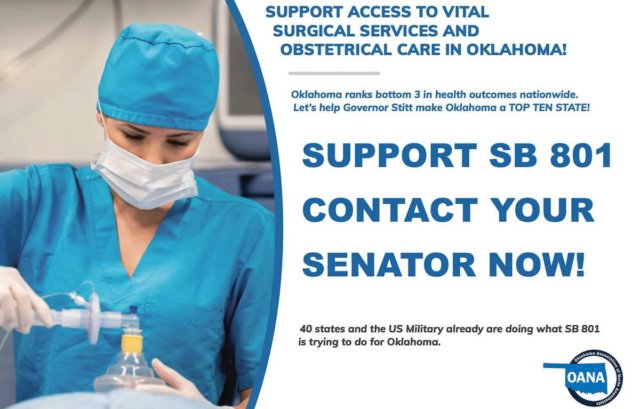
This session, the Legislature will have an opportunity to increase access to health care across the state of Oklahoma. Gov. Kevin Stitt’s inaugural address discussed Oklahoma becoming a top-10 state, but there are many areas needing drastic improvement for this to become a reality.
Oklahoma currently ranks 47th in health care outcomes and has consistently been placed in the bottom quartile. SB 801 and its twin bill HB 1027 seek to modernize Oklahoma’s outdated laws to better define the relationship between a doctor and his or her anesthesia provider, which is often a Certified Registered Nurse Anesthetist or CRNA.
Oklahoma Association of Nurse Anesthetists
Policy Pitch is a series of issue-focused commentaries available for entities with advertising
packages on NonDoc.
CRNAs are a vital part of the Oklahoma health care system. A CRNA is an advanced practice nurse who has completed a masters or doctorate degree in anesthesia. A nurse anesthetist must complete an extensive residency in anesthesiology and pass a certification exam to become board certified.
Their years of training prepare CRNAs to take care of all patients. They do regional anesthesia, general anesthesia and sedation for every type of surgical service. CRNAs also provide anesthesia coverage for all obstetrical patients. They place epidurals for women in labor and do emergency cesarean sections when a baby’s life is in danger. Hospitals are not allowed to offer obstetric delivery services if they do not have anesthesia coverage, which is often provided by CRNAs.
CRNAs can work alone, with other CRNAs or alongside physician anesthesiologists. Multiple studies have shown there is no difference in outcome if a patient is cared for by a CRNA or by a Physician Anesthesiologist.
‘We are in a health care crisis’
There is a direct correlation between access to medical care and health care quality. If a CRNA is not working in rural Oklahoma, a pregnant woman cannot obtain vital prenatal care needed to ensure a healthy delivery. If residents of a rural county in Oklahoma are required to travel hours to the nearest hospital for a colonoscopy, they are much more likely to not receive this important screening test. If a child in rural Oklahoma needs emergency surgery, a nurse anesthetist can be readily available to do the anesthesia needed to save that child’s life.
We are in a health care crisis, and rural Oklahoma is suffering because of this outdated law. Oklahoma is one of only 10 states left in the entire country that have not updated their nursing laws or rules to remove physician supervision from CRNA practice. Currently, when CRNAs provide anesthesia for patients, they are required to be supervised by the dentist, podiatrist or surgeon performing the operation. Or they must be supervised by a physician anesthesiologist. The surgeon often has no part in managing the anesthetic but is required to “supervise” the nurse anesthetist to fulfill the requirement of the current Oklahoma Nurse Practice Act. CRNAs and Surgeons collaboratively work to deliver the best outcomes for patients. Surgeons trust CRNAs to be the anesthesia experts in the operating room, cesarean section rooms and birthing suites.
This first step to improve the overall health of Oklahoma must be taken by the Legislature — remove physician supervision from CRNA practice. Outside of Oklahoma and Tulsa counties, very few nurse anesthetists are being supervised by physician anesthesiologists. Our proposed legislation will provide improvement to current legislation with a singular word change. SB 801 and HB 1027 seek to change the word “supervision” and replace it with “collaboration.” Rather than being supervised by a physician, nurse anesthetists would seek to work in collaboration with them.
U.S. News ranked the 10 best and worst states for health care by examining health care access, public health, and health care quality metrics. Of those top 10 states, none requires CRNAs to be supervised by physicians. Of states ranked in the bottom five, three require CRNAs to be “supervised.” Oklahoma is one of the five worst states in the nation.
The change proposed in SB 801 and HB 1027 is not a radical idea — 40 other states have modernized their laws and removed physician supervision of CRNAs from the Nurse Practice Act. Even the U.S. military doesn’t require the supervision of CRNA. The majority of Oklahoma counties do not have physician anesthesiologists providing anesthesia care — it is CRNAs working in the underserved, rural parts of the state. Supporting “supervision” removal from CRNA practice and replacing it with “collaboration” is best for Oklahomans statewide.






















